虚拟语气虚拟条件句的三种基本类型
虚拟语气的三种形式
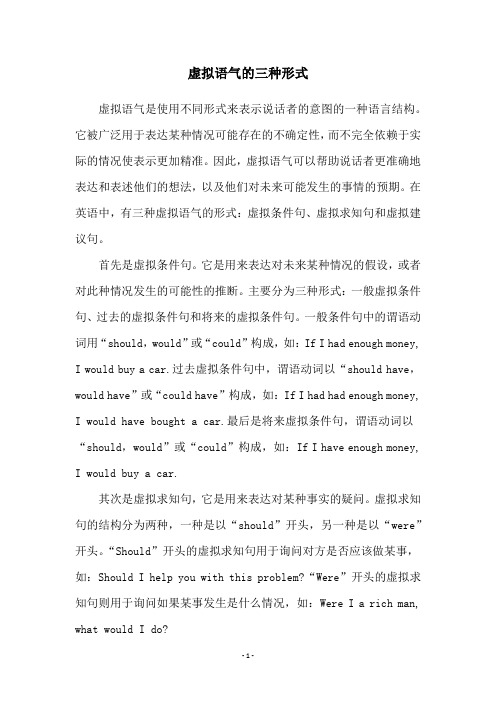
虚拟语气的三种形式虚拟语气是使用不同形式来表示说话者的意图的一种语言结构。
它被广泛用于表达某种情况可能存在的不确定性,而不完全依赖于实际的情况使表示更加精准。
因此,虚拟语气可以帮助说话者更准确地表达和表述他们的想法,以及他们对未来可能发生的事情的预期。
在英语中,有三种虚拟语气的形式:虚拟条件句、虚拟求知句和虚拟建议句。
首先是虚拟条件句。
它是用来表达对未来某种情况的假设,或者对此种情况发生的可能性的推断。
主要分为三种形式:一般虚拟条件句、过去的虚拟条件句和将来的虚拟条件句。
一般条件句中的谓语动词用“should,would”或“could”构成,如:If I had enough money, I would buy a car.过去虚拟条件句中,谓语动词以“should have,would have”或“could have”构成,如:If I had had enough money, I would have bought a car.最后是将来虚拟条件句,谓语动词以“should,would”或“could”构成,如:If I have enough money, I would buy a car.其次是虚拟求知句,它是用来表达对某种事实的疑问。
虚拟求知句的结构分为两种,一种是以“should”开头,另一种是以“were”开头。
“Should”开头的虚拟求知句用于询问对方是否应该做某事,如:Should I help you with this problem?“Were”开头的虚拟求知句则用于询问如果某事发生是什么情况,如:Were I a rich man, what would I do?最后是虚拟建议句,它是用来表达对某种行为或活动的建议。
虚拟建议句以“should”开头,如:You should study hard for your exams.以上就是英语中的虚拟语气的三种形式。
英语中三种虚拟语气
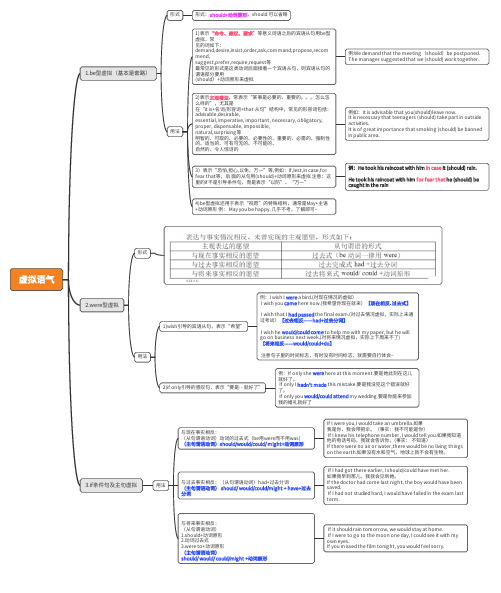
虚拟语⽓1.b e型虚拟(基本是套路)2.w ere型虚拟3.if条件句及主句虚拟形式⽤法⽤法1)表⽰“命令、建议、要求”等意义词语之后的宾语从句⽤b e型虚拟,常⻅的词如下:d e m an d,d es i re,i ns i s t,or d er,as k,co mm an d,p ro p ose,reco mm en d,sugges t,p re f er,re q u i re,re q ues t等最常⻅的形式是这类动词后⾯接着一个宾语从句,则宾语从句的谓语部分要⽤(s h oul d)+动词原形来虚拟2)表⽰主观看法,常表⽰“某事是必要的、重要的。
怎么怎么样的”,尤其是在“it i s+名词/形容词+th a t 从句”结构中,常⻅的形容词包括:a dvi sab le,d es i ra b le,essen ti al, imp era tiv e, imp or t an t, necessar y, o b l i ga t or y,p ro p er, di s p ensa b le, imp oss ib le,na t ural,sur p r i s i ng等明智的、可取的、必要的、必要性的、重要的、必需的、强制性的、适当的、可有可⽆的、不可能的、⾃然的、令⼈惊讶的3)表⽰“恐怕,担⼼,以免,万一”等,例如:if,les t,i n case,f orf ear th a t等,后 ⾯的从句⽤(s h oul d)+动词原形来虚拟 注意:这⾥的if不是引导条件句,⽽是表⽰“以防”、“万一”4)b e型虚拟还⽤于表⽰“祝愿”的特殊结构,通常是M a y+主语+动词原形 例: M a y y ou b e h a ppy. ⼏乎不考,了解即可~与现在事实相反:(从句谓语动词)动词的过去式(b e⽤w ere⽽不⽤w as)(主句谓语动词)s h oul d/w oul d/coul d/ mi g ht+动词原形与过去事实相反:(从句谓语动词)h a d+过去分词(主句谓语动词) s h oul d/ w oul d/coul d/mi g ht + h a v e+过去分词与将来事实相反:(从句谓语动词)1.s h oul d+动词原形2.动词过去式3.w ere t o+动词原形(主句谓语动词)s h oul d/ w oul d/ coul d/mi g ht +动词原形形式:s h oul d+动词原形,s h oul d 可以省略If it s h oul d ra i n t o m orro w, w e w oul d s t a y a t h o m e.If I w ere t o go t o th e m oon one d a y, I coul d see it with myo w n e y es.If y ou mi sse d th e fi l m t on i g ht, y ou w oul d f eel sorr y.If I h a d go t th ere earl i er, I s h oul d/coul d h a v e m e t h er.如果我早到那⼉,我就会⻅到她。
虚拟条件句的三种基本类型

虚拟条件句的三种基本类型:与现在事实相反、与过去事实相反、与将来事实相反。
条件句有真实条件句和非真实(虚拟)条件句两种。
真实条件句所表示的假设是有可能发生的,而非真实条件句则通常表示一种假想,与事实相反或不大可能会发生:If I have time, I will go with them. 假假设我有时间,我就同他们去。
(陈述语气) If I were you, I would go with them. 假假设我是你,我就同他们去。
(虚拟语气) ▲ 与现在事实相反假设与现在事实相反,条件从句的谓语用过去式(be通常用were),主句谓语用“should (would, could, might)+动词原形”:If I knew her number ,I could ring her up. 要是我知道她的号码,我就可以给她打了。
(可惜我不知道)▲与过去事实相反假设与过去事实相反,条件从句的谓语用过去完成时(had+过去分词),主句谓语用“should (would, could, might)+have+过去分词”:If I’d left sooner,I’d have been on time. 要是我早点动身,我就准时到了。
(但我动身太迟了)▲与将来事实相反假设与将来事实相反,条件从句的谓语用过去式(be通常用were),主句谓语用“should (would, could, might)+动词原形”:If I asked him,I’m sure he’d help us. 如果我向他提出要求,肯定他会帮助我们。
(不过我不打算这样做)注:几点特别说明①主句谓语中的should主要用于第一人称后。
would, might, could的大致区别是:would表示结果,might表示可能性,could表示能力、允许或可能性。
比较:If you tried again ,you would succeed. 要是你再试一试,你就会成功的。
虚拟条件句的三种基本类型 与现在事实相反 与过去事实相反 与将来事实相反

1.条件句有真实条件句和非真实(虚拟)条件句两种。
真实条件句所表示的假设是有可能发生的,而非真实条件句则通常表示一种假想,与事实相反或不大可能会发生:If I have time, I will go with them. 假若我有时间,我就同他们去。
(陈述语气)If I were you, I would go with them. 假若我是你,我就同他们去。
(虚拟语气)▲ 与现在事实相反若与现在事实相反,条件从句的谓语用过去式(be通常用were),主句谓语用“should (would, could, might) 动词原形”:If I knew her number ,I could ring her up. 要是我知道她的电话号码,我就可以给她打电话了。
(可惜我不知道)▲与过去事实相反若与过去事实相反,条件从句的谓语用过去完成时(had 过去分词),主句谓语用“should (would, could, might) have 过去分词”:If I’d lef t sooner,I’d have been on time. 要是我早点动身,我就准时到了。
(但我动身太迟了)▲与将来事实相反若与将来事实相反,条件从句的谓语用过去式(be通常用were),主句谓语用“should (would, could, might) 动词原形”:If I asked him,I’m sure he’d help us. 如果我向他提出要求,肯定他会帮助我们。
(不过我不打算这样做)注:几点特别说明① 主句谓语中的should主要用于第一人称后。
would, might, could的大致区别是:would表示结果,might表示可能性,could表示能力、允许或可能性。
比较:If you tried again ,you would succeed. 要是你再试一试,你就会成功的。
(would表结果)If you tried again, you might succeed. 要是你再试一试,你可能会成功的。
虚拟语气三种基本结构表格

虚拟语气三种基本结构表格虚拟语气是一种表示假设、愿望、建议、命令等非事实状态的语法现象。
根据虚拟语气的用法,可以将它分为三种基本结构:虚拟条件句、虚拟假设句和虚拟祈使句。
一、虚拟条件句虚拟条件句用于表示与事实相反或不可能实现的条件。
虚拟条件句一般由“if”引导,主句可以用"would/could/should/might + 动词"的形式来表示结果。
1.虚拟条件句基本结构:-如果主句的谓语动词是一般过去时,从句的谓语动词使用过去完成时。
例如:If I had studied harder, I would have passed the exam.(如果我学习更努力一些,我就能通过考试了。
)-如果主句的谓语动词是现在时,从句的谓语动词使用过去完成时。
例如:If it hadn't rained, we would have gone to the park.(如果没有下雨,我们就去公园了。
)2.虚拟条件句的用法:-表示与现在事实相反的假设;例如:If I were you, I would quit that job.(如果我是你,我就辞职。
)-表示与过去事实相反的假设;例如:If I had known it, I would have told you.(如果我当时知道,我就告诉你了。
)-表示对未来的猜测、设想或假设;例如:If he arrives late, we will start without him.(如果他迟到了,我们将开始而不等他。
)二、虚拟假设句虚拟假设句用于表示与现在或将来事实相反的假设。
虚拟假设句的谓语动词一般使用"should/were"的形式。
1.虚拟假设句基本结构:-表示与现在事实相反的假设:例如:I wish I were taller.(但事实上我并不高。
)-表示与将来事实相反的假设:例如:If I should see him, I will tell him.(但我并不打算去找他。
英语语法知识虚拟语气

【导语】在⼤学英语六级考试中,单独考察六级语法的题型不多,但是语法知识点却贯穿整张试卷,下⾯是⽆忧考为⼤家整理的基础语法知识——虚拟语⽓。
1. 表⽰现在/过去/将来情况的虚拟条件句虚拟条件句主要有三种结构:1) 表⽰与现在情况相反:主句谓语⽤“would / could / might +动词原形”,从句谓语⽤“动词的⼀般过去时”(动词be的过去式⼀律⽤were)。
If I were you, I would not accept his offer.If I had time, I would certainly go to the cinema with you.2) 表⽰与过去情况相反:主句谓语⽤“would / could / might + have +过去分词”,从句谓语⽤过去完成时。
If I had got up a little earlier, I wouldn’t have missed the train.If I had been more careful, I might have passed that exam.3) 表⽰与将来情况相反:主句谓语⽤“would / could / might +动词原形”,从句谓语⽤“were +动词不定式”或“should +动词原形”。
If I were to do the job, I would not be able to have enough time to study.If it should rain tomorrow, I would not go out with you.2. 虚拟条件句连接词if的省略如果虚拟条件句的从句中含有were, had, should, could等词时,可以省略连接词if,但这时必须把were, had, should, could等词移到主语前⾯,形成倒装。
这种句型主要⽤于书⾯形式。
虚拟语气的三种用法
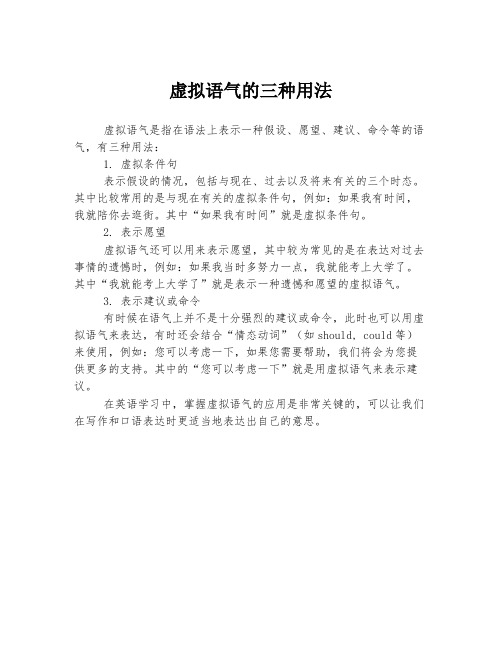
虚拟语气的三种用法
虚拟语气是指在语法上表示一种假设、愿望、建议、命令等的语气,有三种用法:
1. 虚拟条件句
表示假设的情况,包括与现在、过去以及将来有关的三个时态。
其中比较常用的是与现在有关的虚拟条件句,例如:如果我有时间,我就陪你去逛街。
其中“如果我有时间”就是虚拟条件句。
2. 表示愿望
虚拟语气还可以用来表示愿望,其中较为常见的是在表达对过去事情的遗憾时,例如:如果我当时多努力一点,我就能考上大学了。
其中“我就能考上大学了”就是表示一种遗憾和愿望的虚拟语气。
3. 表示建议或命令
有时候在语气上并不是十分强烈的建议或命令,此时也可以用虚拟语气来表达,有时还会结合“情态动词”(如should, could等)来使用,例如:您可以考虑一下,如果您需要帮助,我们将会为您提供更多的支持。
其中的“您可以考虑一下”就是用虚拟语气来表示建议。
在英语学习中,掌握虚拟语气的应用是非常关键的,可以让我们在写作和口语表达时更适当地表达出自己的意思。
虚拟语气分三种情况来掌握

虚拟语气分三种情况来掌握:1、虚拟条件句。
2、名词性虚拟语气。
3、虚拟语气的其他用语。
一、虚拟条件句:条件状语从句是非真实情况,在这种情况下要用虚拟语气。
1、条件从句与现在事实不一致,其句型为:If 主语+过去时,主语+should(could, would,或might)+动词原形,如:If I were you, I wouldstudyhard.If it rained, I wouldnot be here now.2、条件从句与过去事实不一致,句型为:If 主语+had+过去分词,主语+should(could, would,或might)+have+过去分词,如:If the doctor had come last night, the boy wouldhave saved.If I had not studie d hard, I wouldhave failed in the exam last term.3、条件从句与将来事实不一致,句型为:+do,主语+should(could…)+原形do过去时(与现在事实条件句一样)。
If it should rain tomorr ow, we wouldstay at home.If I were to go to the moon one day, I couldsee it with my own eyes.If you missed the film to night, you wouldfeel sorry.注意问题:1、If条件句中绝对不可出现“would”。
2、根据句中的时间状语,有时可能出现“混合虚拟”的情况,即主句可能是现在的情况,条件句也许是发生在过去的情况,但都是遵守上述句型。
3、在条件句中如果出现we re, had, should可省去if,将主语与这些词倒装,例如:Had the doctor come last night, the boy wouldhave saved.Were I to go to the moon one day, I wouldsee it with my own eyes.Should it rain tomorr ow, we wouldstay at home.二、名词性虚拟语气:在表示命令、建议要求、惊叹时的名词性从句中需用虚拟语气,基本句型:主语+(should)+动词原形,如:Mother insist ed that John go to bed at 9 o’clock.(宾语从句)We sugges ted that the meetin g should not be held.It was requir ed that the cropsshould be harves ted at once.(主语从句)The sugges tionthat he be invite d was reject ed.(同位语从句)That is theirdemand that theirwagesbe increa sed.(表语从句)注意:在这种句子中绝不出现“would”“must”“could”等。
虚拟语气分三种情况来掌握

虚拟语气分三种情况来掌握:1、虚拟条件句。
2、名词性虚拟语气。
3、虚拟语气的其他用语。
一、虚拟条件句:条件状语从句是非真实情况,在这种情况下要用虚拟语气。
1、条件从句与现在事实不一致,其句型为:If 主语+过去时,主语+should(could, would, 或might)+动词原形,如:If I were you, I would study hard.If it rained, I would not be here now.2、条件从句与过去事实不一致,句型为:If 主语+had+过去分词,主语+should(could, would, 或might)+have+过去分词,如:If the doctor had come last night, the boy would have saved.If I had not studied hard, I would have failed in the exam last term.3、条件从句与将来事实不一致,句型为:+do,主语+should(could…)+原形do过去时(与现在事实条件句一样)。
If it should rain tomorrow, we would stay at home.If I were to go to the moon one day, I could see it with my own eyes.If you missed the film to night, you would feel sorry.注意问题:1、If条件句中绝对不可出现“would”。
2、根据句中的时间状语,有时可能出现“混合虚拟”的情况,即主句可能是现在的情况,条件句也许是发生在过去的情况,但都是遵守上述句型。
3、在条件句中如果出现were, had, should可省去if,将主语与这些词倒装,例如:Had the doctor come last night, the boy would have saved.Were I to go to the moon one day, I would see it with my own eyes.Should it rain tomorrow, we would stay at home.二、名词性虚拟语气:在表示命令、建议要求、惊叹时的名词性从句中需用虚拟语气,基本句型:主语+(should)+动词原形,如:Mother insisted that John go to bed at 9 o’clock.(宾语从句)We suggested that the meeting should not be held.It was required that the crops should be harvested at once.(主语从句)The suggestion that he be invited was rejected.(同位语从句)That is their demand that their wages be increased.(表语从句)注意:在这种句子中绝不出现“would”“must”“could”等。
虚拟语气的总结总览

虚拟语气的总结总览虚拟语气是一种语法现象,用于表达非现实的情况、假设的情况或者推测的情况。
在中文中,虚拟语气主要通过动词的词形变化来表示,而在英语中,虚拟语气除了动词词形变化外,还可以通过其他语法结构来表示。
在英语中,虚拟语气主要有三种形式:虚拟条件句、虚拟愿望句和虚拟建议句。
1. 虚拟条件句:用于表示假设的情况或者与事实相反的情况。
虚拟条件句有三种形式:与过去事实相反的假设、与现在事实相反的假设和与将来事实相反的假设。
- 与过去事实相反的假设:形式为"if + 过去完成时,would/could/might + 动词原形"。
例如:"If I had studied harder, I would have passed the exam."(如果我研究更努力,我就能通过考试。
)- 与现在事实相反的假设:形式为"if + 过去时,would/could/might + 动词原形"。
例如:"If I were you, I would go on the trip."(如果我是你,我会去旅行。
)- 与将来事实相反的假设:形式为"if + 过去完成时,would/could/might + have + 过去分词"。
例如:"If it hadn't rained, we would have gone to the beach."(如果没有下雨,我们就去海滩了。
)2. 虚拟愿望句:用于表示对现在或将来的非现实愿望或希望。
虚拟愿望句有两种形式:对现在的愿望和对将来的愿望。
- 对现在的愿望:形式为"虚拟语气的过去时/现在时 +would/could/might + 动词原形"。
例如:"I wish I were taller."(我希望自己更高。
虚拟语气的用法归纳讲解
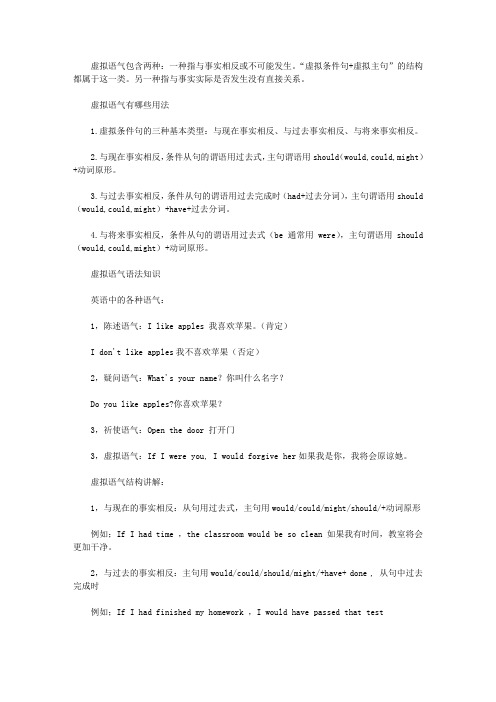
虚拟语气包含两种:一种指与事实相反或不可能发生。
“虚拟条件句+虚拟主句”的结构都属于这一类。
另一种指与事实实际是否发生没有直接关系。
虚拟语气有哪些用法1.虚拟条件句的三种基本类型:与现在事实相反、与过去事实相反、与将来事实相反。
2.与现在事实相反,条件从句的谓语用过去式,主句谓语用should(would,could,might)+动词原形。
3.与过去事实相反,条件从句的谓语用过去完成时(had+过去分词),主句谓语用should (would,could,might)+have+过去分词。
4.与将来事实相反,条件从句的谓语用过去式(be通常用were),主句谓语用should (would,could,might)+动词原形。
虚拟语气语法知识英语中的各种语气:1,陈述语气:I like apples 我喜欢苹果。
(肯定)I don't like apples我不喜欢苹果(否定)2,疑问语气:What's your name?你叫什么名字?Do you like apples?你喜欢苹果?3,祈使语气:Open the door 打开门3,虚拟语气:If I were you, I would forgive her如果我是你,我将会原谅她。
虚拟语气结构讲解:1,与现在的事实相反:从句用过去式,主句用would/could/might/should/+动词原形例如;If I had time ,the classroom would be so clean 如果我有时间,教室将会更加干净。
2,与过去的事实相反:主句用would/could/should/might/+have+ done , 从句中过去完成时例如;If I had finished my homework ,I would have passed that test如果当时我完成了我的做,我就能够通过我的考试了。
虚拟语态
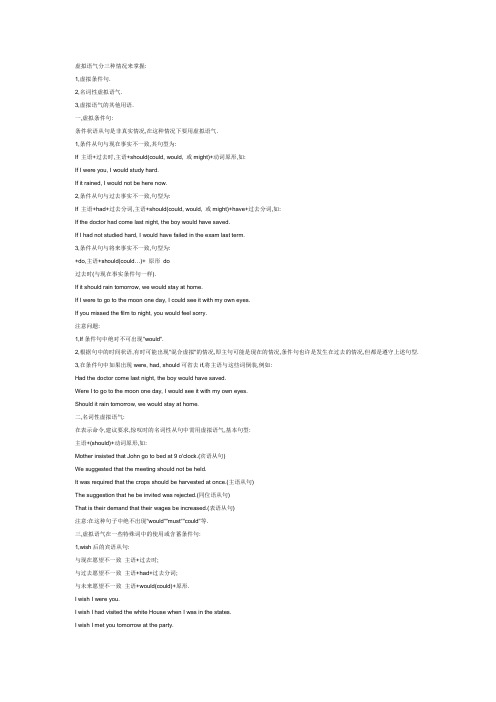
虚拟语气分三种情况来掌握:1,虚拟条件句.2,名词性虚拟语气.3,虚拟语气的其他用语.一,虚拟条件句:条件状语从句是非真实情况,在这种情况下要用虚拟语气.1,条件从句与现在事实不一致,其句型为:If 主语+过去时,主语+should(could, would, 或might)+动词原形,如:If I were you, I would study hard.If it rained, I would not be here now.2,条件从句与过去事实不一致,句型为:If 主语+had+过去分词,主语+should(could, would, 或might)+have+过去分词,如:If the doctor had come last night, the boy would have saved.If I had not studied hard, I would have failed in the exam last term.3,条件从句与将来事实不一致,句型为:+do,主语+should(could…)+ 原形do过去时(与现在事实条件句一样).If it should rain tomorrow, we would stay at home.If I were to go to the moon one day, I could see it with my own eyes.If you missed the film to night, you would feel sorry.注意问题:1,If条件句中绝对不可出现"would".2,根据句中的时间状语,有时可能出现"混合虚拟"的情况,即主句可能是现在的情况,条件句也许是发生在过去的情况,但都是遵守上述句型. 3,在条件句中如果出现were, had, should可省去if,将主语与这些词倒装,例如:Had the doctor come last night, the boy would have saved.Were I to go to the moon one day, I would see it with my own eyes.Should it rain tomorrow, we would stay at home.二,名词性虚拟语气:在表示命令,建议要求,惊叹时的名词性从句中需用虚拟语气,基本句型:主语+(should)+动词原形,如:Mother insisted that John go to bed at 9 o'clock.(宾语从句)We suggested that the meeting should not be held.It was required that the crops should be harvested at once.(主语从句)The suggestion that he be invited was rejected.(同位语从句)That is their demand that their wages be increased.(表语从句)注意:在这种句子中绝不出现"would""must""could"等.三,虚拟语气在一些特殊词中的使用或含蓄条件句:1,wish后的宾语从句:与现在愿望不一致主语+过去时;与过去愿望不一致主语+had+过去分词;与未来愿望不一致主语+would(could)+原形.I wish I were you.I wish I had visited the white House when I was in the states.I wish I met you tomorrow at the party.2,It's time句型:当It's time后用that从句时应该为:主语+should+原形或主语+过去时,例如:It's time that you went to school. 或It's time that you should go to school.3,If only引起的感叹句相当于"How I wish+宾语从句"If only he could come! 他要能来就好了.If only I had known the answer! 我要早知答案就好了.4,would rather, as if(though)引导的句子也需使用虚拟,表示过去的情况用过去完成时,表示现在与将来的情况用过去时,如: I'd rather you posted the letter right away.I'd rather you had returned the book yesterday.She loves the children as if they were hers.Alan talked about Rome as if he had been there.5,without, but, but for, otherwise引起的短语或句子常暗含着含蓄条件.Without you, I would never know him.But for your cooperation, we wouldn't have done the work so well.But that she was afraid, she would have said no.I would be most glad to help you, but I' am busy now.I would have come to the party yesterday, but I was working.I am busy now, otherwise I would do you the favor!【专项训练一】1,It is important that a college student a foreign language.A.will masterB.masterC.mastersD.would master2,It is strange that she without saying a word.A.should have gone outB.wentC.should go outD.goes out3,If my lawyer here last Saturday, he me from going.A.had been, would have preventedB.had been, would preventC.were, would preventD.were, would have prevent4, ——"He is a brave man."——"Yes, I wish I his courage."A.haveB.hadC.will haveD.may have5,If it rain, the crops would be saved.A.shouldB.willC.is going toD.was to6,He ordered that the medicine by a special plane.A.was sentB.would be sentC.should sendD.be sent7,If you the medicine, you better now.A.took, would feelB.had taken, feltC.had taken, would feelD.took, would have felt8,She is my sister, but she often acts as if my mother.A.isB.wasC.wereD.had been9,I went to bed early last night, but I wish I so.A.didn't doB.hadn't doC.haven't doneD.couldn't do10,I'd rather he tomorrow afternoon.A.will comeesingD.came答案:1,B 2,A 3,A 4,B 5,A6,D 7,C 8,C 9,B 10,D【专项训练二】I.经典试题回顾:1. Oh, I'm not feeling well in the stomach. I____ so much fried chicken just now. (0 2春季上海)A. shouldn't eat B .mustn't have eatenC. shouldn't have eatenD. mustn't eat2. How I wish every family ____ a large house with a beautiful garden. (0 2春季上海)A. hasB. hadC. will haveD. had had3.--I hear you've got a set of valuable Australian coins.____ I have a look--Yes, certainly. (0 2春季上海)A. DoB. MayC. ShallD. Should4--I heard they went skiing in the mountains last winter.--It____ true because there was little snow there.(02北京)A. may not beB. won't beC. couldn't beD. mustn't be5. It has been announced that candidates____ remain in their seats until all the papers have been collected.A. canB. willC. mayD. shall (02上海)6. A left-luggage office is a place where bags ______ be left for a short time, especially at a railway station. (NMET03)A. shouldB. canC. mustD. will7. How ____ you say that you really understand the whole story if you have covered only part of the article can B. must C. need D. may (03上海卷)8. — Isn' t that Ann's husband over there— No, it _______ be him -I'm sure he doesn't wear glasses. (04河南/北,安徽,江西)A. can'tB. must notC. won'tD. may not9. You ______ be tired. You've only been working for an hour. (04四川,吉林,黑龙江,云南)A. must notB. won' tC. can' tD. may not10.I often see lights in that empty house. Do you think I _____ report it to the police (04内蒙,海南)A. shouldB. mayC. willD. can11.Mr. White _____ at 8:30 for the meeting, but he didn't' show up. (04内蒙,海南)A. should have arrivedB. should arriveC. should have had arrivedD. should be arriving12. — Who is the girl standing over there— Well , if you ______ know , her name is Mabel .(04天津)A. mayB. canC. mustD. shall13.—Excuse me . Is this the right way to the Summer Palace—Sorry , I am not sure . But it _______ be . (04湖北)A.mightB.willC.mustD.can14.---- Excuse me, but I want to use your computer to type a report.---- You ______ have my computer if you don't take care of it. (04湖南)A. shan'tB. might notC. needn'tD. shouldn't15. I ____ pay Tracy a visit, but I am not sure whether I will have time this Sunday. (04浙江)A. shouldB. mightC. wouldD. could16.—Go for a picnic this weekend ,OK—_______ .I love getting close to nature. (04福建)A.I couldn't agree moreB.I'm afraid notC.I believe notD.I don't think so17.—I'll tell Mary about her new job tomorrow.—You________ her last week. (04福建)A.ought to tellB.would have toldC.must tellD.should have told18."The interest______ be divided into five parts, according to the agreement made by both sides," declared the judge. (04重庆)A. mayB. shouldC. mustD. shall19.Children under 12 years of age in that country ________ be under adult supervision when in a public library.( 04上海)A. mustB. mayC. canD. need20.—Mum , I've been studying English since 8 o'clock. ______ I go out and play with Tom for a while—No, I'm afraid not . Besides , it's raining outside now . (04辽宁)A.Can'tB.Wouldn'tC.May notD.Won't21. --- I don't mind telling you what I know.--- You_______. I'm not asking you for it. (04江苏)A. mustn'tB. may notC. can'tD. needn'tII.巩固练习:1.---You didn't invite John to the party---_____him, tooA Must I inviteB Must I have invitedC Should I inviteD Should I have invited2.Night has fallen, we have to stay here for the night, ____A don't weB hasn't itC mustn't weD doesn't it3. --Would you please not throw your shoes on the floor--I am sorry I __ do it again.A needn'tB can'tC wouldn'tD won't4. I tried to call on you last week but your dog simply ____ not let me come through the gateA couldB wouldC mightD should5. ---A man is asking to see you. _____ he come in---- Let him in.A. MustB. ShallC. WillD. Dare6.She ____ terribly tired last night. She had been working without a break for over ten hours.A maybeB had beenC used to beD must have been7. Do tell me what you'd like for your birthday ,dear,______A will youB do youC don't youD can't you8. --Do you regret paying five dollars for the book--No, I _____twice as much for it.A would gladly have paidB had gladly paid9. -Don't forget to write to me when you get home.--_____.A I mustB I shouldC I won'tD I will10. We ____ last night, but we went to the concert instead.A must have studiedB might studyC should have studiedD would study11. They would have bought that house, which stood at the foot of the hill, ____ at that time.A. though they hadn't had enough moneyB. otherwise they hadn't enough moneyC. if they had enough moneyD. but they didn't have enough money12. As it tuned out to be a small house party, we ____ so formally.A. needn't dress upB. couldn't have dressed upC. didn't need dress upD. needn't have dressed up13. --Might I watch TV after supper-Yes, you ____A mayB mustC mightD can14. If you listen to me, you ____have some candies, Tommy.A. are able toB. shallC. mustD. need15. You must have been to London for many times, _____ youA mustn'tB didn'tC haven'tD may not16. --What do you think of it--I think it is a thing of importance that it ____ done soon.A. isB. is to beC. beD. to be17. --Alice , why didn't you come yesterday--I ____ , but I had an unexpected visitor.A hadB wouldC was going toD did18.In the summer vacation we____ often take a walk along the river.A mightB couldC wouldD should19. ---- Why does Sara know so much about Angkor Wat---- She _____ have been there, orA mustB oughtn't toC mayD can't20. The line was busy. Someone_____ the telephone.A may have usedB must have been usingC may be usingD must be using21. He was late for class today. But for the heavy fog, he ____ an hour earlier.A could comeB could have comeC were to comeD should come22.I'm sure you'd rather she stayed in France, _____A wouldn't youB didn't youC shouldn't youD couldn't you23.Michael____ be a policeman, for he's much too short.A needn'tB can'tC shouldD may24. ____ I had time, I would have run round that lake again.A IfB UnlessC HadD When25.If you really want yourself to be in good health ,you ____always____ so much.A mustn't; be smokingB needn't; smokeC won't; be smokingD can't; smoke26. It's strange that the boy ____ without saying good-bye to the teacher.A must have leftB have leftC can have leftD may have left27. He was taken away by the police .He ____ for a thief.A must mistakeB must be mistakenC must have been mistakenD must have mistaken28.I____ opera ,but now I'm getting interested.A was used to likeB didn't use to likeC used to likeD was used to liking29.She's already an hour late, What _____to herA can have happenedB may happenC should have happenedD may have happened30.When a friend of mine gave me a ticket for the game, I ____ go.A couldn't helpB can't butC couldn't help butD just have to31. Without electricity, human life _____ quite different today.A isB will beC would have beenD would be32.Yesterday, Jane walked away from the discussion. Otherwise, she ____ something she would regret later.A had saidB saidC might sayD might have said33. ____it rain tomorrow, we would have to put off the visit to the Yang Pu Bridge.A WereB ShouldC WouldD Will34. Jane's pale face suggested that she ____ ill, and her parents suggested that she ____ a medicalexamination.A be; should haveB was; haveC should be; hadD was; has35.I left very early last night, but I wish I____ so early.A didn't leaveB hadn't leftC haven't leftD couldn't leave36.The two strangers talked as if they ____ friends for years.A should beB would beC have beenD had been37.Jim would rather _____ now, but we must go to work.A that we don't leaveB we not leaveC we didn't leaveD our not leaving38.I didn't call to make my friend attend the meeting , but I ____A should haveB may haveC must haveD shall have39. It was required that each student____ enough food on the trip.A bringB broughtC would bringD had better bring40. Kunar can take his car apart and put it back together again. I certainly wish he ____ me how.A teachesB will teachC has taughtD would teach41. If you children _____ do as I tell you, you ____ go to the party.A won't; shan'tB don't; won'tC won't; shouldn'tD don't; had better not经典试题回顾答案:1-5 CBCCD 6-10 BAACA 11-15 ACAAA 16-20 ADDAA 21D巩固练习答案及部分答案解析:1-5 DADBB 6-10DAACC 11-15DDDBC 16-20CCCCB 21-25 BABCA26-30 BCBAC 31-35 DDBBB 36-40DCAAD 41A4.B.would可表示过去反复发生的动作或某种倾向.5.B.shall用于第一,第三人称疑问句中,表示说话人征求对方的意见和向对方请示9.C.用will表示意志决心,补全句子应该是I won't forget to…易错选D.14.B.shall用于第二,第三人称陈述句中,表示说话人给对方的命令,警告,允诺或威胁,26.B..在It is十形容词(necessary,natural,strange,etc.)十that从句中用虚拟语气,31.D.有时为了表达的需要,在虚拟语气中并不总是出现if引导的条件句,而通过用介词短语替代条件句其他手段来替代条件句.常用介词有with,without,but for等.33.B.如果从句中含有系动词,情态动词或助词时,可省略if把从句中的were,had或should提到其主语前形成倒装结构34.B.当suggest作"暗示,表明''讲,insist作"坚持说"讲,即坚持事实是怎样时,后边that从句不用虚拟语气.39.A.在动词demand,order,require,insist,suggest等后that引导的宾语从句中用虚拟语气,常用"should+动词原形"且should可以省略.。
虚拟语气三个基本句型
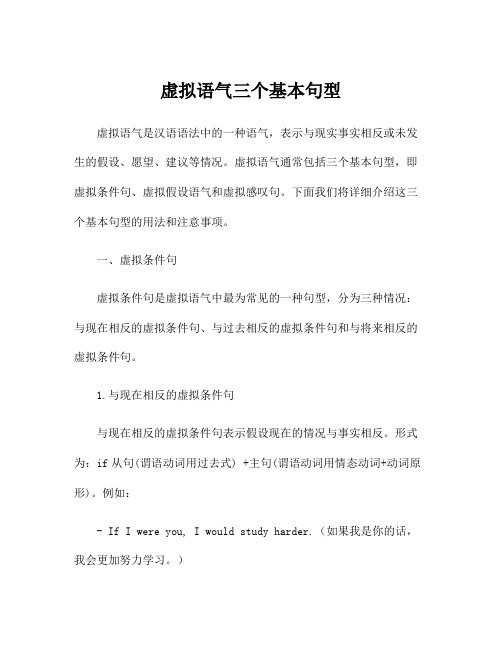
虚拟语气三个基本句型虚拟语气是汉语语法中的一种语气,表示与现实事实相反或未发生的假设、愿望、建议等情况。
虚拟语气通常包括三个基本句型,即虚拟条件句、虚拟假设语气和虚拟感叹句。
下面我们将详细介绍这三个基本句型的用法和注意事项。
一、虚拟条件句虚拟条件句是虚拟语气中最为常见的一种句型,分为三种情况:与现在相反的虚拟条件句、与过去相反的虚拟条件句和与将来相反的虚拟条件句。
1.与现在相反的虚拟条件句与现在相反的虚拟条件句表示假设现在的情况与事实相反。
形式为:if从句(谓语动词用过去式) +主句(谓语动词用情态动词+动词原形)。
例如:- If I were you, I would study harder.(如果我是你的话,我会更加努力学习。
)- If it rained tomorrow, I would stay at home.(如果明天下雨的话,我会呆在家里。
)需要注意的是:(1)虚拟条件句中如果从句的主语是第一人称(例如“I”),则其谓语动词需用were,而不是was。
这是因为虚拟语气中“were”是通用的,表示与现实情况相反的语境。
(2)在虚拟条件句中,主句的谓语动词需要用情态动词+动词原形的形式,表示“将会如此”或“应该如此”。
(3)虚拟条件句有时也可以倒装,即主句中的情态动词和主语顺序调换。
例如:“Were I you, I would study harder.”(如果我是你的话,我会更加努力学习。
)2.与过去相反的虚拟条件句与过去相反的虚拟条件句表示假设过去的情况与事实相反。
形式为:if从句(谓语动词用过去完成时) +主句(谓语动词用情态动词+have+动词过去分词)。
例如:- If I had known the answer, I would have told you.(如果我知道了答案,我会告诉你的。
)- If I had studied harder at school, I would have got a better job.(如果我在学校时更加努力学习,我会有一份更好的工作。
语法中的虚拟语气

语法中的虚拟语气虚拟语气是语法中一种用于表达与事实相反、假设、愿望、建议等不确定或不存在的情况的语气形式。
在英语语法中,虚拟语气分为三种形式,包括虚拟条件句、虚拟愿望句和虚拟建议句。
本文将对这三种形式进行介绍和解释。
一、虚拟条件句1. 与现在事实相反的虚拟条件句在英语中,我们使用过去式来表示与现在事实相反的虚拟条件句。
例如:If I were a bird, I could fly to anywhere I want.(如果我是一只鸟,我就可以任意飞到任何地方。
)注意,这里用了"were"而不是"was",这是因为在第二人称单数和第三人称单数中,动词"be"的过去式都是"were"。
2. 与过去事实相反的虚拟条件句与过去事实相反的虚拟条件句使用过去完成时或过去将来完成时来表示。
例如:If I had studied harder, I would have passed the exam.(如果我学得更努力些,我就能通过考试了。
)在这个例子中,我们使用了过去完成时来表示过去的虚拟情况。
二、虚拟愿望句虚拟愿望句用于表达现在或过去对目前情况不满意的愿望。
在虚拟愿望句中,我们使用"would"或"could"来表示愿望。
例如:I wish I could speak fluent French.(我希望我能够流利地说法语。
)这个例子表达了对现状的不满意和对能够流利说法语的渴望。
三、虚拟建议句虚拟建议句用于提出建议或要求,表达一种建议但并不强烈要求对方按建议去做。
在虚拟建议句中,常常使用"should"或"would"来表示建议。
例如:I suggest that he should take a break and relax.(我建议他休息一下,放松一下。
虚拟语气和虚拟条件句
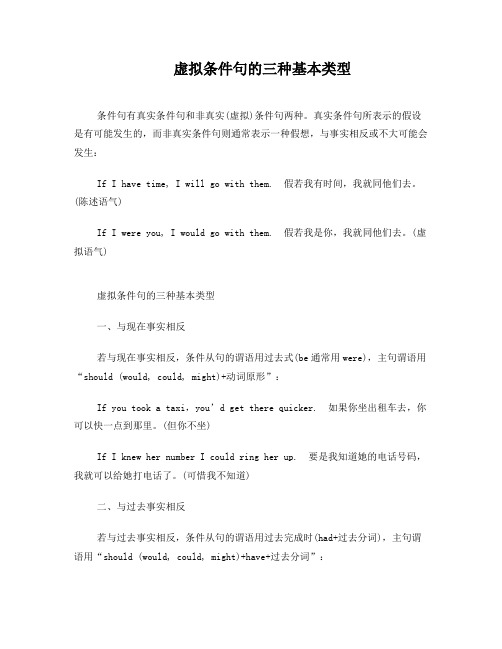
虚拟条件句的三种基本类型条件句有真实条件句和非真实(虚拟)条件句两种。
真实条件句所表示的假设是有可能发生的,而非真实条件句则通常表示一种假想,与事实相反或不大可能会发生:If I have time, I will go with them. 假若我有时间,我就同他们去。
(陈述语气)If I were you, I would go with them. 假若我是你,我就同他们去。
(虚拟语气)虚拟条件句的三种基本类型一、与现在事实相反若与现在事实相反,条件从句的谓语用过去式(be通常用were),主句谓语用“should (would, could, might)+动词原形”:If you took a taxi,you’d get there quicker.如果你坐出租车去,你可以快一点到那里。
(但你不坐)If I knew her number I could ring her up. 要是我知道她的电话号码,我就可以给她打电话了。
(可惜我不知道)二、与过去事实相反若与过去事实相反,条件从句的谓语用过去完成时(had+过去分词),主句谓语用“should (would, could, might)+have+过去分词”:If I’d left sooner,I’d have been on time.要是我早点动身,我就准时到了。
(但我动身太迟了)If we had found him earlier we could have saved his life. 要是我们当时早点找到他的话,我们就可以救活他。
(可惜我们找到他太晚了)三、与将来事实相反若与将来事实相反,条件从句的谓语用过去式(be通常用were),主句谓语用“should (wo uld, could, might)+动词原形”:If he went,would you go too? 如果他去,你也去吗?(大概他不会去)If I asked him,I’m sure he’d help us.如果我向他提出要求,肯定他会帮助我们。
虚拟语气的种类与常见用法总结
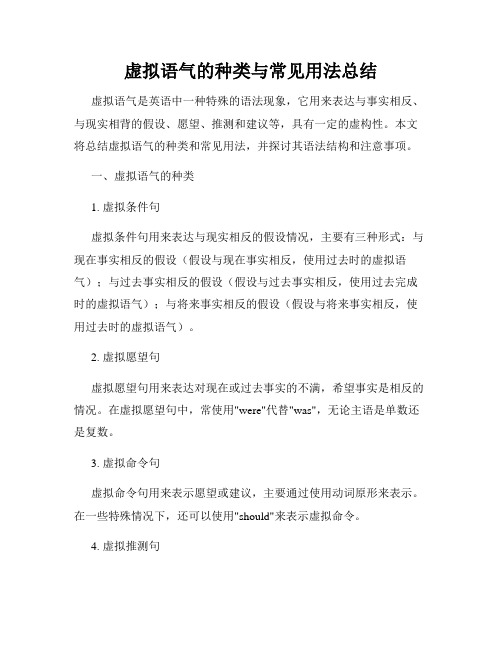
虚拟语气的种类与常见用法总结虚拟语气是英语中一种特殊的语法现象,它用来表达与事实相反、与现实相背的假设、愿望、推测和建议等,具有一定的虚构性。
本文将总结虚拟语气的种类和常见用法,并探讨其语法结构和注意事项。
一、虚拟语气的种类1. 虚拟条件句虚拟条件句用来表达与现实相反的假设情况,主要有三种形式:与现在事实相反的假设(假设与现在事实相反,使用过去时的虚拟语气);与过去事实相反的假设(假设与过去事实相反,使用过去完成时的虚拟语气);与将来事实相反的假设(假设与将来事实相反,使用过去时的虚拟语气)。
2. 虚拟愿望句虚拟愿望句用来表达对现在或过去事实的不满,希望事实是相反的情况。
在虚拟愿望句中,常使用"were"代替"was",无论主语是单数还是复数。
3. 虚拟命令句虚拟命令句用来表示愿望或建议,主要通过使用动词原形来表示。
在一些特殊情况下,还可以使用"should"来表示虚拟命令。
4. 虚拟推测句虚拟推测句用来表示对过去情况的推测,常使用"should"、"would"或"might"来表示。
二、虚拟语气的常见用法1. 条件虚拟语气条件虚拟语气常用于表达与现实相反的假设条件,如"if I were you,I would..."(如果我是你,我会……)。
2. 虚拟愿望语气虚拟愿望语气通常用于表达对过去或现在情况的不满或愿望,如"I wish I were taller."(但愿我长得更高。
)。
3. 建议虚拟语气建议虚拟语气常用于表示建议、要求或命令,如"I suggest that you come early."(建议你早点来。
)。
4. 推测虚拟语气推测虚拟语气常用于表示对过去情况的推测,如"He spoke as if he knew everything."(他说话的口气像是他什么都知道。
英语虚拟语气的假设用法

英语虚拟语气的假设用法虚拟语气是英语中一种表达假设、愿望、建议和怀疑等情态的语气。
通过使用虚拟语气,我们可以表达一种与实际情况相反或不确定的假设条件。
在本文中,我将介绍英语虚拟语气的基本用法和常见的假设用法。
一、虚拟语气的基本用法1. 虚拟条件句虚拟条件句用于表达与现实相反或不确定的假设条件,常用的形式有三种:与现在事实相反的假设、与过去事实相反的假设和与将来事实相反的假设。
与现在事实相反的假设:如果我是你,我会去旅行。
如果他不那么忙,他就会来帮忙。
与过去事实相反的假设:如果我知道你的电话号码,我会给你打电话的。
如果你昨天早点告诉我,我就不会错过那趟火车。
与将来事实相反的假设:如果明天下雨,我们就不去郊游了。
如果他通过考试,他就会得到奖学金。
2. 虚拟情态动词的用法在虚拟条件句中,常常使用情态动词来表示虚拟语气,如should, would, could等。
如果我有足够的时间,我可以完成这个任务。
如果他能提前告诉我,我会提前准备好。
二、虚拟语气的假设用法1. 表达建议使用虚拟语气可以表达建议或提出一种假设性的情况,以引起对方的思考或讨论。
你应该每天锻炼,这样你会更健康。
要是你去那个城市的话,你会喜欢那里的。
2. 表达愿望虚拟语气可以用来表达对现实情况的不满或对未来情况的期望。
要是我有更多的时间,我就可以找到一份更好的工作。
我希望我能参加明天的会议,但是我不确定是否能去。
3. 表达怀疑虚拟语气也可以用于表达怀疑,表示对某件事情的真实性或可能性的疑问。
要是他是个诚实的人,他就会承认错误。
如果这个消息是真的,我们应该尽快采取行动。
三、虚拟语气的注意事项1. 时态一致在虚拟语气中,主句和从句的时态要保持一致。
如果我有时间,我会去看电影。
(现在时态)如果我有时间,我会去看电影。
(过去时态)如果我有时间,我会去看电影。
(将来时态)2. 虚拟语气与现实情况的对比虚拟语气常用于与现实情况作对比,强调与实际情况的差异。
语法进阶虚拟语气的三种形态

语法进阶虚拟语气的三种形态在学习语法的过程中,虚拟语气是一个相对复杂的概念。
它是一种特殊的语法形态,用来表达一种假设、愿望、建议或者可能性。
虚拟语气可以分为三种形态:与现在事实相反的虚拟条件句、与过去事实相反的虚拟条件句和与将来事实相反的虚拟条件句。
接下来将逐一介绍这三种形态。
与现在事实相反的虚拟条件句,表示与现在事实相反的假设情况。
这种形态通常使用“如果”或“要是”引导,谓语动词使用过去时态,而主句使用与过去时态相对应的情态动词。
例如:“如果我有钱,我就买辆新车。
”。
在该句中,“我有钱”与现实情况相反,因此使用了虚拟语气。
与过去事实相反的虚拟条件句,表示与过去事实相反的假设情况。
这种形态通常使用“如果”或“要是”引导,谓语动词使用过去完成时态,而主句使用“would/could/should + have + 过去分词”的形式。
例如:“如果我昨天早点起床,我就不会迟到了。
”。
在该句中,“我昨天早点起床”与过去事实相反,因此使用了虚拟语气。
与将来事实相反的虚拟条件句,表示与将来事实相反的假设情况。
这种形态通常使用“如果”或“要是”引导,谓语动词使用现在时态,而主句使用“would/could/should + 动词原形”的形式。
例如:“如果明天下雨,我们就不去郊游了。
”。
在该句中,“明天下雨”与将来事实相反,因此使用了虚拟语气。
虚拟语气在语言表达中具有重要的作用,它可以用来表示假设、愿望、建议或者可能性。
通过掌握这三种形态的用法,我们可以更加准确地表达自己的意思,并丰富语言表达的方式。
总结来说,虚拟语气是一种用来表达假设、愿望、建议或者可能性的语法形态。
它可以分为与现在事实相反的虚拟条件句、与过去事实相反的虚拟条件句和与将来事实相反的虚拟条件句三种形态。
通过练习和实践,我们可以逐渐掌握和应用这些形态,从而提升我们的语言表达能力。
虚拟语气

e. 将条件隐含在某些连词中 I didn’t know that he was a cheat, or else I wouldn’t have believed him. 我 不知道他是个骗子,不然我也不会相信他 了。(or else=if I had known he was a cheat) I’m really very busy, otherwise I would certainly go there with you. 我 真的是太忙了,不然我就会同你一道去了。 (otherwise=if I were not so busy)
②.倒装虚拟句(有三种倒装形式) Had I had enough money, I would have bought a book. Were I to have enough money, I would buy a book. Should I have enough money, I would buy a book.
- 1、下载文档前请自行甄别文档内容的完整性,平台不提供额外的编辑、内容补充、找答案等附加服务。
- 2、"仅部分预览"的文档,不可在线预览部分如存在完整性等问题,可反馈申请退款(可完整预览的文档不适用该条件!)。
- 3、如文档侵犯您的权益,请联系客服反馈,我们会尽快为您处理(人工客服工作时间:9:00-18:30)。
【英语语法整理】虚拟语气:虚拟条件句的三种基本类型条件句有真实条件句和非真实(虚拟)条件句两种。
真实条件句所表示的假设是有可能发生的,而非真实条件句则通常表示一种假想,与事实相反或不大可能会发生:
If I have time, I will go with them. 假若我有时间,我就同他们去。
(陈述语气)
If I were you, I would go with them. 假若我是你,我就同他们去。
(虚拟语气)
虚拟条件句的三种基本类型
一、与现在事实相反
若与现在事实相反,条件从句的谓语用过去式(be通常用were),主句谓语用"sh ould (would, could, might)+动词原形":
If you took a taxi, you'd get there quicker. 如果你坐出租车去,你可以快一点到那里。
(但你不坐)
If I knew her number I could ring her up. 要是我知道她的电话号码,我就可以给她打电话了。
(可惜我不知道)
二、与过去事实相反
若与过去事实相反,条件从句的谓语用过去完成时(had+过去分词),主句谓语用“should (would, could, might)+have+过去分词”:
If I'd left sooner,I'd have been on time. 要是我早点动身,我就准时到了。
(但我动身太迟了)
If we had f ou nd him earlier we cou ld have sa ved his life. 要是我们当时早点找到他的话,我们就可以救活他。
(可惜我们找到他太晚了)
三、与将来事实相反
若与将来事实相反,条件从句的谓语用过去式(be通常用were),主句谓语用"should (would, could, might)+动词原形":
If he went, would you go too? 如果他去,你也去吗?(大概他不会去)
If I asked him, I'm sure he'd help us. 如果我向他提出要求,肯定他会帮助我们。
(不过我不打算这样做)
注:几点特别说明
①主句谓语中的shoul d主要用于第一人称后。
woul d, might, could的大致区别是:would表示结果,might表示可能性,could表示能力、允许或可能性。
比较:
If you tried again you woul d succeed. 要是你再试一试,你就会成功的。
(would表结果)
If you tried again you might succeed. 要是你再试一试,你可能会成功的。
(might表可能)
If you tried again you could succeed. 要是你再试一试,你就能成功了。
(could表能力)
②条件从句的谓语动词为be时,不管其主语为单数还是复数通常都用were,但在口语或非正式文体中的单数第一人称和第三人称后,也可用was,不过在If I were you这样的表达中,通常还是以用were为宜。
③有时条件从句用would表示愿意:
If he would live on with me, I would be his better half. 要是他还愿意跟我过,我仍会做他的妻子。
④对于与将来事实相反的情形,请注意以下几点:
一是这里说的与将来事实相反,实为对将来情况的推测;
二是此用法中的条件从句谓语除用过去式外,有时也用“should+动词原形”(表示可能性极小,常译为“万一”)或“were to+动词原形”(表示与将来事实相反的假设);
三是当条件从句使用“should+动词原形”这样的谓语时,主句谓语除可用“should (would, could, might)+动词原形”这样的虚拟语气外,也可用陈述语气或祈使语气:
If it should rain tomorrow, don't expect me.万一明天下雨,就不要等我了。
I should see him, I'll tell him. 万一我见到他,我就告诉他。
